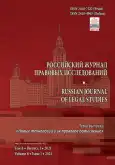Методы анализа влияния процессов трансформации права на развитие социально-экономической системы в условиях цифровизации: сценарный подход (постановка задачи)
- Авторы: Шульц В.Л.1, Кульба В.В.2, Шелков А.Б.2, Чернов И.В.2, Тимошенко А.А.3
-
Учреждения:
- Центр исследования проблем безопасности Российской академии наук
- Институт проблем управления имени В.А. Трапезникова Российской академии наук
- Университет прокуратуры Российской Федерации
- Выпуск: Том 8, № 1 (2021)
- Страницы: 19-36
- Раздел: Актуальная тема
- URL: https://journal-vniispk.ru/2410-7522/article/view/65146
- DOI: https://doi.org/10.17816/RJLS65146
- ID: 65146
Цитировать
Аннотация
Статья посвящена исследованию методологических проблем повышения эффективности процессов управления трансформацией права в условиях развитого информационного общества и оценке их влияния на процессы социально-экономического развития государства и общества.
Рассмотрены методы и технологии анализа и управления развитием сложных социально-экономических систем. Для решения методологических и практических задач повышения эффективности систем законодательного регулирования в условиях цифровизации предложено использовать методологию сценарного анализа, обеспечивающую возможность интеллектуальной поддержки и оценки качества подготовки и реализации решений, исполняемых в сфере законодательной деятельности. Предложенный для решения рассматриваемых задач подход основан на опережающем сценарном анализе и моделировании процессов развития исследуемых ситуаций в политико-правовой, общественно-политической, социально-экономической и инновационно-технологической сферах. Это позволит проработать альтернативные варианты развития правоприменительной ситуации, для которой вообще характерны неполнота информации и наличие высокого уровня неопределенности в ее развитии.
Авторами сформулированы перспективные направления будущих теоретических и прикладных исследований в рамках развития методологии сценарного анализа социально-экономической действительности, урегулированной нормами права.
Ключевые слова
Полный текст
Открыть статью на сайте журналаОб авторах
Владимир Леопольдович Шульц
Центр исследования проблем безопасности Российской академии наук
Email: lbogat@mail.ru
доктор философских наук, член-корреспондент РАН, заслуженный деятель науки Российской Федерации, лауреат премии Правительства Российской Федерации в области образования, научный руководитель
Россия, МоскваВладимир Васильевич Кульба
Институт проблем управления имени В.А. Трапезникова Российской академии наук
Email: lbogat@mail.ru
доктор технических наук, профессор, заслуженный деятель науки Российской Федерации, главный научный сотрудник
Россия, МоскваАлексей Борисович Шелков
Институт проблем управления имени В.А. Трапезникова Российской академии наук
Email: lbogat@mail.ru
кандидат технических наук, ведущий научный сотрудник
Россия, МоскваИгорь Викторович Чернов
Институт проблем управления имени В.А. Трапезникова Российской академии наук
Email: lbogat@mail.ru
кандидат технических наук, заведующий лабораторией
Россия, МоскваАндрей Анатольевич Тимошенко
Университет прокуратуры Российской Федерации
Автор, ответственный за переписку.
Email: lbogat@mail.ru
профессор, кандидат юридических наук, доцент
Россия, МоскваСписок литературы
- Шульц В.Л., Бочкарев С.А., Кульба В.В. и др. Анализ проблем трансформации систем законодательного регулирования и правоприменения в условиях цифровизации и методов оценки эффективности принимаемых решений // Национальная безопасность / nota bene. 2019. № 4. С. 19–74.
- Модели и методы анализа и синтеза сценариев развития социально-экономических систем: в 2-х кн. / Под ред. В.Л. Шульца и В.В. Кульбы. М.: Наука, 2012. Кн. 1. 304 с., кн. 2. 358 с.
- Форрестер Дж. Мировая динамика. М.: Наука, 1978. 167 с.
- Медоуз Д.Х., Медоуз Д.Л., Рандерс Й., Беренс В.В. Пределы роста. М.: Изд-во МГУ, 1991. 208 с.
- Kahn H. On escalation: Metaphors and scenarios. New York: Praeger, 1965. 308 p.
- Kahn H., Wiener A. The year 2000: A framework for speculations on the next 33-year. New York: Macmillan, 1967. 431 p.
- Акофф Р. Искусство решения проблем. М.: Мир, 1982. 230 с.
- Ансофф И. Стратегическое управление. М.: Экономика, 1989. 519 с.
- Данилов-Данильян В.И., Рывкин А.А. Прогнозирование и планирование // Системные исследования: Ежегодник. М.: Наука, 1981. C. 39–59.
- Лисичкин В.А. Теория и практика прогностики: методологические аспекты. М.: Наука, 1972. 224 с.
- Минский М. Фреймы для представления знаний. М.: Энергия, 1979. 151 с.
- Линдгрен М., Бандхольд Х. Сценарное планирование: связь между будущим и стратегией. М.: ЗАО «Олимп - Бизнес», 2009. 256 с.
- Шульц В.Л., Бочкарев С.А., Кульба В.В. и др. Сценарное исследование проблем обеспечения общественной безопасности в условиях цифровизации. М.: Проспект, 2020. 240 с.
- Шульц В.Л., Бочкарев С.А., Кульба В.В. и др. Сценарный анализ проблем трансформации правоохранительной системы в условиях цифровизации // Вопросы безопасности. 2019. № 4. С. 36–65.
- Шульц В.Л. Сценарный анализ в управлении социальной безопасностью // Национальная безопасность / nota bene. 2012. № 6. С. 2–21.
- Шульц В.Л., Кульба В.В., Шелков А.Б и др. Сценарный анализ в управлении геополитическим информационным противоборством. М.: Наука, 2015. 542 с.
- Шульц В.Л., Кульба В.В., Шелков А.Б. и др. Использование сценарного подхода в процессах управления противодействием коррупции (на примере строительной отрасли) // Российский журнал правовых исследований. 2020. Т. 7. № 1. С. 64–77.
- Шульц В.Л., Кульба В.В., Шелков А.Б. и др. Управление региональной безопасностью на основе сценарного подхода. М.: ИПУ РАН, 2014. 162 с.
- Шульц В.Л., Кульба В.В., Шелков А.Б. и др. Управление техногенной безопасностью на основе сценарного и индикаторного подходов. М.: ИПУ РАН, 2013. 116 с.
- Бочкарев С.А. О противодействии коррупции в Российской Федерации: новые подходы без инноваций // Право и политика. 2008. № 11. С. 2591–2594.
- Бочкарев С.А. Собственность как охраняемое благо уголовного права // Право и политика. 2009. № 5. С. 952–957.
- Бочкарев С.А. О природе общественной опасности преступления // Бизнес в законе. 2009. № 5. С. 155–159.
- Гусейнов А.А., Степин В.С., Смирнов А.В. и др. Пути развития философии права в России // Российский журнал правовых исследований. 2017. № 1 (10). С. 9–46.
- Тимошенко А.А. Внутренние факторы трансформации судебно-правоохранительной системы // Пробелы в российском законодательстве. 2019. № 5. С. 172–176.
- Тимошенко А.А. Внешние факторы трансформации судебно-правоохранительной системы и сценарный анализ судебной реформы // Вестник Воронежского государственного университета. Серия: Право. 2019. № 4. С. 274–383.
Дополнительные файлы










